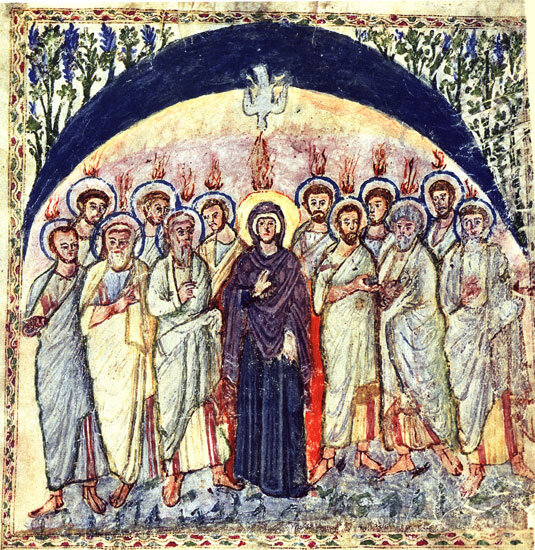Let’s talk about waiting
The word “Pentecost” literally means “50th,” as in the 50th day following the Easter vigil. It may seem strange to name one of our high holy days in this way. Why have we been counting days since Jesus’ Resurrection? Has the Resurrection inaugurated something we’re supposed to wait for?
Well, the disciples were definitely waiting for something. Before Jesus ascended, they asked him if the time had come for him to restore Israel to its former glory. In a characteristically maddening response, he instructed them to wait: wait in Jerusalem, wait for the Holy Spirit, wait to become his witnesses in a new and powerful way. Wait... as if they hadn’t already waited long enough!
The disciples wanted Jesus to overthrow their enemy, Israel’s enemy — the Roman Empire. Instead, Jesus overthrew Death, and the disciples got the Church instead of a gloriously renewed Israel. Moreover, the Church fairly quickly came to include a much broader membership than the sons and daughters of Abraham and Sarah. Gentile membership in the Church brought with it many problems that ultimately exposed a lot of lingering habits and biases that wouldn’t serve the Church as it continued to explore what it meant to be Jesus’s witnesses and, more paradoxically, Jesus body in the world. How can you be Christ to someone if you insist they must first be circumcised? How can you love someone as yourself if you think you have earned a righteousness for yourself that is greater than what God has given them in Christ?
The gift of the Holy Spirit on that 50th day inaugurated a new kind of community that we’re still trying to understand, and a liberty that we still haven’t quite embraced. The Church, apparently, still has a lot of learning to do.
And what about us? What will we do this Pentecost? What are we waiting for? What community and liberty are we being called to in 2020, especially when physical and embodied community is that much harder to come by? Whither the Church?
I’ve wondered about this lately, and I can’t claim to have many complete answers, but I’m reminded of the Pentecost icon. Those of you familiar with iconography might notice the similarities to the Theophany icon (which depicts Jesus’ baptism). Imagine it in your minds eye— Jesus stands in the Jordan with John the Baptist at his side, and directly above Jesus the Dove descends, framed by a triangular shaft of light pointing down towards Jesus’ head.
Pentecost, from the 6th c. Rabulla Gospels
Now look at both Pentecost icons. The Dove descends on the disciples, in the middle of which stands Mary, erect and in a teaching pose. The Dove is framed by light, albeit in different ways. And tongues of fire dance above each of the disciples and Mary. It’s a beautiful picture of the Church assembled.
But, I wonder, where is Jesus?
The Pentecost icon asks us to embrace our identity, the Church’s identity as Christ in the world. The baptized are Christ’s limbs, and eyes, and ears in the world. We are Christ’s witnesses not in a juridical sense, but rather in a really intimate and personal identification. In baptism, you have been made like Christ and have been invited through the power of the Holy Spirit to continue in that made-likeness as a process of identifying with and as Christ more and more. Where is Jesus? Jesus is the assembled Church. Is that a comforting thought, or a scary one?
A modern rendition of the Pentecost icon
Embracing this identity during the current pandemic is made all the more important because our times to gather as community are precious few, but they’re available nonetheless. We might not gather in our Church building, but we can gather in small groups. We can meet — socially distanced, of course! — in coffee shops and on walks. We can gather in small numbers on driveways and in parks. And for all of us, including those who can’t get outside, we can gather over zoom and phone calls.
And what can we do in these small gatherings. We can give and ask for prayer. We can encourage and share burdens. We can exhort and receive exhortation. We can teach and be taught. In these moments, we can be Christ to each other. From what I can tell, all of us are in desperate need of a lot more of this.
Yes, this Pentecost, perhaps more than any other in recent memory, we wait for something to happen. But in all the waiting, we shouldn’t waste the wondrous opportunity we have, an opportunity to reflect, to grow in the Spirit, and to become united as the Church in a refreshed and reformed way. The Spirit moves in each one of us, challenging us to give voice to the deep groaning and passions that God has laid on our hearts. Who better to share this with than other Christians, those like us who have been called to be Christ in the world?
Dan+
Ascensiontide, 2020


